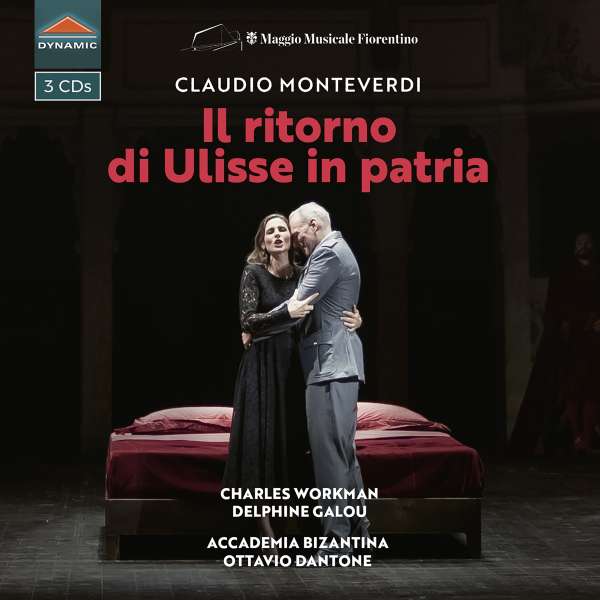Il ritorno d’Ulisse in patria von Claudio Monteverdi (1567-1643) erzählt von dem Helden Ulisse, also Odysseus, der nach dem Trojanischen Krieg und jahrelanger Irrfahrt in seine Heimat zurückkehrt. Dort muss er grausame Prüfungen, Entbehrungen, Verrat und Betrug über sich ergehen lassen, bevor er mit seiner geliebten Königin Penelope wiedervereint wird und sein Königreich zurückerobern kann.
Ottavio Dantone benutzt die neue kritische Edition von Bernardo Ticci. Sein Ensemble Accademia Bizantina lässt er genau so dramatisch und energisch wie rhetorisch-gefühlvoll, also mit prononciertem Affetto musizieren. Dabei fällt die prägnant gestaltende Continuo-Gruppe auf.
Delphine Galou singt die Penelope sehr bewegend und mit guter Stimmführung. Mit ihrem hellen Alt zeichnet sie eine junge Penelope.
Der amerikanische Tenor Charles Workman singt den Odysseus mit einer fein ausgewogenen und nie überforderten Stimme. Die Artikulierung ist vorzüglich und das Timbre ist angenehm, weil Workman jede Säuerlichkeit vermeiden kann. Sein ausdrucksstarker und fein differenzierender Odysseus ist hervorragend.
In der weiteren Besetzung mit um die 20 Rollen fällt Arianna Vendittelli mit ihrer attraktiven und emotional gesteuerten Stimme auf. Damit gelingt ihr eine entzückende Minerva.
Der Bariton Gianluca Margheri erweist sich mit seiner wohl timbrierten und gut geführten Stimme als sehr guter Giove. Eine herausragende Leistung kommt vom Tenor John Daszak in der Rolle des nimmersatten Iro. Er kann das Komödiantische der Rolle perfekt ausreizen. Alle anderen Rollen sind zufriedenstellend besetzt.
Insgesamt ist das also eine Darbietung von hohem Niveau, die zu Recht vom Publikum des Maggio Musicale in Florenz gefeiert wurde.
Il ritorno d’Ulisse in patria by Claudio Monteverdi (1567-1643) tells of the hero Ulisse, i.e. Odysseus, who returns to his homeland after the Trojan War and years of wandering. There he must endure cruel trials, hardships, betrayal and deceit before being reunited with his beloved Queen Penelope and reclaiming his kingdom.
Ottavio Dantone uses the new critical edition by Bernardo Ticci. He has his ensemble Accademia Bizantina perform just as dramatically and energetically as rhetorically-emotionally, that is, with pronounced affetto. The succinctly shaping continuo group stands out.
Delphine Galou sings Penelope very movingly and with good voice leading. With her bright alto she portrays a young Penelope.
The American tenor Charles Workman sings Odysseus with a finely balanced and never strained voice. The articulation is exquisite and the timbre is pleasant as Workman avoids any sourness. His expressive and finely differentiated Odysseus is excellent.
In the rest of the cast of around 20 roles, Arianna Vendittelli stands out with her attractive and emotionally controlled voice. With this she succeeds in playing a delightful Minerva.
Baritone Gianluca Margheri proves to be a very good Giove with his well-timbred and well-managed voice. An outstanding performance comes from tenor John Daszak in the role of the gluttonous Iro. He is able to perfectly exploit the comedic nature of the role. All the other roles are satisfactorily cast.
All in all, then, this is a performance of high caliber, rightly celebrated by the audience at the Maggio Musicale in Florence.


















